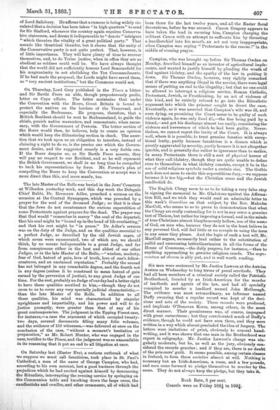The late Master of the Rolls was buried in the
Jews' Cemetery at Willesden yesterday week, and this day week the Delegate -Chief Rabbi, Dr. Hermann Adler, preached a sermon on the -.occasion at the Central Synagogue, which was preceded by a prayer for the soul of the deceased Judge ; so that it is clear that the Jews do not countenance the curious superstition of some Protestants against prayers for the dead. The prayer was -that God would "remember in mercy" the soul of the departed, that his soul might be "bound up in the bond of life everlasting," -and that his rest might be "in peace." Dr. Adler's sermon was on the duty of the Judge, and on the qualities essential to a perfect Judge, as described by the old Jewish sages, of -which seven were enumerated, two of which are, we should -think, by no means indispensable to a great Judge, and far from conspicuous either in the best and ablest of our other Judges, or in the late Master of the Rolls,—" wisdom, modesty, fear of God, hatred of gain, love of truth, love of one's fellow- creatures, and an unstained reputation." Probably the second has not belonged in any remarkable degree, and the fourth not in any degree (unless it be construed to mean hatred of gain -earned by the perversion of justice), to any great Judge of our time. For the rest, probably no Judge of onrday had a better right to have these qualities ascribed to him,—though they do not seem to LIB to cover any very specially judicial characteristic,— than the late Master of the Rolls. In addition to all these qualities, his mind was characterised by singular uprightness and impartiality, and his power and will to do justice promptly, were greater than that of any of his great contemporaries. The judgment in the Epping Forest ease, for instance,—a case the argument of which occupied twenty- two days, covered documents filling many folio volumes, and the evidence of 150 witnesses,—was delivered at once on the -conclusion of the case, "without a moment's hesitation or preparation," as Mr. Robert Hunter, who was engaged in the -case, testifies to the Times, and the judgment was so unassailable in its reasoning that it put an end to all litigation at once.


































 Previous page
Previous page